|
|
|
|
|
| 1 |
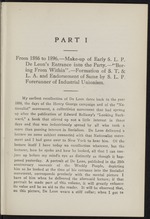 |
“...connected with that Nationalist move-
ment and I had gone over to New York to hear him. Of the
lecture itself I have today no recollection whatever, but the
lecturer, how he spoke and how he looked, all that I can con-
jure up before my minds eye as distinctly as though it hap-
pened yesterday. A portrait of De Leon, published in the 2Sth
anniversary souvenir of the Weekly People, depicting
him as he looked at the time of his entrance into the Socialist
movement, corresponds precisely with the mental picture I
have of him when he delivered the aforesaid lecture; if that
portrait be made part of this volume, it will greatly enhance
its value and be an aid to the reader. It will be observed that,
on this picture, De Leon wears a stiff collar; when I got to...”
|
|
| 2 |
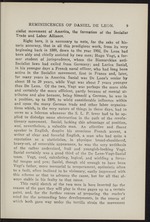 |
“...assisted by two men; Hugo Vogt, a for-
mer student of jurisprudence, whom the Bismarckian anti-
Socialist laws had exiled from Germany; and Lucicn Sanial,
in his younger days a French naval officer, who had long been
active in the Socialist movement, first in France and, later,
for many years in America. Sanial was De Leons senior by
about 18 to 20 years, while Vogt was about 7 years younger
than De Leon. Of the two, Vogt was perhaps the more able
and certainly the more efficient, partly because of mental at-
tributes and also because, being himself a German, he was in
a position, up to 1899, to wield considerable influence within
and upon the many German trade and other labor organiza-
tions which, in the very nature of things in those days, had to
serve as a fulcrum whenever the S. L. P. lever had to be ap-
plied to dislodge some obstruction in the path of the revolu-
tionary movement. Sanial, lacking this advantage of position,
was, nevertheless, a valuable man. An effective and fluent
speaker...”
|
|
| 3 |
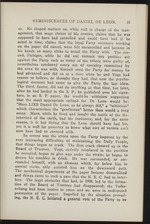 |
“...is well for posterity to know what sort of vermin such
men have had to contend with.
So severe was the strain upon the Party imposed by the
ever increasing difficulties of maintaining the Daily People,
that things began to crack. The first crack showed up in the
Board of Trustees. Vogt, entirely misplaced in the position
he occupied, began to give way under the strain; he began to
drown his troubles in drink. He was surrounded, or sur-
rounded himself, with an element which, far below him in
mental status, ably assisted him on the downward path.
he mechanical department of the paper became demoralized
and things came to such a pass that the N. E. C had to inter-
fere. The legal obstacles that had, in 1900, led to the forma-
tion of the Board of Trustees had disappeared; the Volks-
zeitung had been beaten in court and we were in undisputed
possession of the paper. Impelled by the situation prevail-
ing, the N. E. C, initiated a general vote of the Party to so...”
|
|
| 4 |
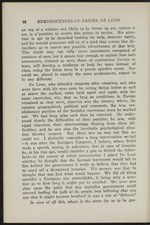 |
“...6S REMINISCENCES OF DANIEL DE LEON.
on top of a volcano and likely to be blown up any minute is
not in a'position to evolve fine points in tactics. His atten-
tion is apt to be absorbed looking fox help, however vainly,
and his mental processes will be of a kind that scorns fine dis-
tinctions as to source and possible effectiveness of that help.
This simile may not fully cover movements composed of
numbers of men, but it comes near enough to explain how such
movements, situated as were those of continental Europe at
least, will develop a tendency to look for mass instead of
class, using the latter term in a purely sportive sense. Nor
could we, placed in exactly the same predicament, expect to
be any different.
De Leon, who attended congress after congress, and who
went there with his eyes open for seeing things below as well
as above the surface, came back again and again with the
same conviction, viz., that so long as conditions in Europe
remained as they were, America was the country...”
|
|
| 5 |
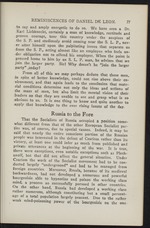 |
“...like an employee who feels un-
der obligation not to offend his employer. When the point is
pressed home to him by an S. L. P. man, he advises that we
join the larger party. SicI Why doesn't he join the larger
party .today? ^
^ From all of this we may perhaps deduce that these men
in spite of better knowledge, could not rise above their en-
vironment, and that again leads to the conclusion that mate-
rial conditions determine not only the ideas and actions of
the mass of men, but also limit the mental vision of their
leaders so that they are unable to see and grasp what is so
obvious to us. It IS one thing to know and quite another to
apply that knowledge to the ever rising issues of the day.
Russia to the Fore
That the Socialists of Russia occupied a position some-
what different from that of the other European Socialist par-
ties was, of course, due to special causes. Indeed, it may be
said that nearly the entire conscious portion of the Russian
people was interested in the defeat of Czarism...”
|
|
| 6 |
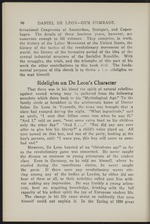 |
“...Stuttgart, and Copen-
hagen. The details of these fourteen years, however, are
numerous enough to fill volumes. They comprise, in truth,
the history of the Labor Movement of the United States, the
history of the tactics of the revolutionary movement of the
world; the history of the formative period of the idea of the
central industrial structure of the Socialist Republic. With
the struggles, the trials, and the triumphs of this part of his
work the other contributions to this book deal. The funda-
mental purpose of this sketch is to throw a f. w sidelights on
the man himself.
Sidelights on De Leons Character
That there was in his blood the spirit of natural rebellion
against vested wrong may be gathered from the following
anecdote which dates back to his Mythological Age. To the
family circle at breakfast in the aristocratic home of Doctor
Solon De Leon in Venezula, the news was brought that a
slave had escaped during the night. What ingratitude, said
an uncle, I sent that fellow some rum when...”
|
|
| 7 |
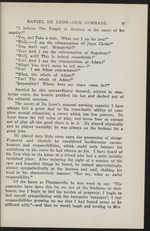 |
“...Well, welll This is indeed remarkable!
^ Yes! And I am the reincarnation of Adam!
What! You dont mean to tell me____?
Yes! I am Adam reincarnated!
What, the whole of Adam?
Yes! The whole of Adam!
Iimpossible! Where does my share come in!?
Startled by this extraordinary demand, uttered in sten-
torian voice, the lunatic grabbed his hat and dashed out of
the editorial sanctum.
The secret of De Leons unusual working capacity I have
always laid a great deal to his remarkable ability of com-
plete mental relaxation, a secret which too few possess. De
Leon knew the full value of play, and knew how to extract
out of play all the good there is in it. He played physically
and he played mentally; he was always on the lookout for a
good joke.
He placed very little store upon the possession of things.
Property and chattels he considered burdensome encum-
brances and responsibilities, which could only hamper his
usefulness to the cause he had chosen as his. I have heard of
his hrst visit to the home...”
|
|
| 8 |
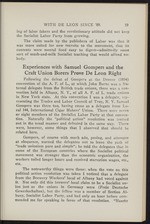 |
“...WITH DE LEON SINCE 89. 19
ing of labor fakers and the revolutionary attitude did not keep
the Socialist Labor Party from growing.
The claim made by the publishers of Labor was that it
was more suited for new recruits to the movement, that its
contents were mental food easy to digestadmittedly some
sort of mush-and-milk Socialist teaching that would offend no-
body.
Experiences with Samuel Gompers and the
Craft Union Borers Prove Dc Leon Right
Following the defeat of Gompers at the Denver (1894)
convention of the A. F. of L., at which John Burns was a fra-
ternal delegate from the British trade unions, there was a con-
vention held in Albany, N. Y., of all A. F. of L. trade unions
in New York state. At this convention I was a delegate, rep-
resenting the Trades and Labor Council of Troy, N. Y. Samuel
Gompers was there too, having come as a delegate from Lo-
cal 144, International Cigar Makers Union. There were seven
or eight members of the Socialist Labor Party at that conven-
tion. Naturally...”
|
|
| 9 |
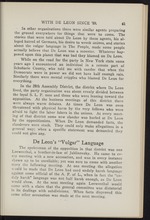 |
“...his al-
leged hatred of Germans, his desire to wreck unions, and stories
about the vulgar language in The People, made some people
actually believe that De Leon was a monster. Whatever hap-
pened upon this planet that was bad they blamed on De Leon.
While on the road for the party in New York state some
years Ago I encountered an individual in a remote part of
Schoharie County, who told me with candor that when the
Democrats were in power we did not have half enough rain.
Similarly there were mental cripples who blamed De Leon for
everything.
In the 28th Assembly District, the district where De Leon
lived, the party organization was about evenly divided between
the loyal S. L. P. men and those who were leaning toward the
opposition. At the business meetings of this district there
were always warm debates. At times De Leon was even
threatened with physical harm by the very fellows who were
afraid to fight the labor fakers in the unions. At every meet-
ing of that district some new slander...”
|
|
| 10 |
 |
“...FROM 1908 TO DANIEL DE LEONS
DEATH IN 19U
Fourth Convention of I.W.W. Packed by Bum-
mery Element and De Leon Unseated as
Delegate Unity Movement Milwaukee
CrazeDe Leons Greatness
All the efforts of De Leon to preserve harmony in the
I. W. W. were unavailing. St. John, Trautmann, Edwards,
and the majority of the five members of the General Execu-
tive Board turned over night, so to speak, against the funda-
mental principles of industrialism as laid down in the I.W.W.
preamble. They no longer recognized political action as nec-
essary. It was a repetition of the stupid Sherman attempt to
get rid of the Socialist Labor Party element and thus find it
easier to break into the Socialist Party and its much larger
membership, and fish in troubled waters.
Once started on the road of inconsistency the Bummery
stage was soon reached. At a special session of the General
Executive Board held in January, 1908, in New York city, De
Leon appeared and endeavored to enlighten those who gave
signs of being...”
|
|
| 11 |
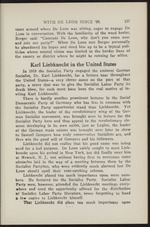 |
“...WITH DE LEON SINCE 89. 157
came around where De Leon was sitting, eager to engage De
Leon in conversation. With the familiarity of the ward heeler,
Berger said; Comrade De Leon, why dont you come over
and join our party? When De Leon met Berger personally
he abandoned his hopes and sized him up to be a typical poli-
tician whose mental vision was limited to the border lines of
the county or district where he might be running for office.
Karl Liebknecht in the United States
In 1910 the Socialist Party engaged the eminent German
Socialist, Dr. Karl Liebknecht, for a lecture tour throughout
the United Statesa very clever move on the part of that
party, a move that was to give the Socialist Labor Party its
death blow, for such must have been the real motive of in-
viting Karl Liebknecht.
There is hardly another prominent lecturer in the Social
Democratic Party of Germany who has less in common with
the Socialist Party opportunist stand than Liebknecht. Yet
Liebknecht, the leader of the rev...”
|
|
| 12 |
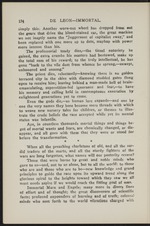 |
“...terraced city in the skies with diamond studded gates flung
open to receive him; leaving behind a man-made hell of brain-
emasculating, superstition-fed ignorance and fear, to have
his memory and calling held in contemptuous execration by
enlightened generations yet to come.
Even the gods die,as human lore expandsand one by
one the very names they bore become mere threads with which
to weave new nursery tales for children, or themes to illus-
trate the crude beliefs the race accepted while yet its mental
status was infantile.
Aye, in countless thousands mortal things and things be-
got of mortal wants and fears, are chemically changed, or dis-
appear, and all goes with them that they were or stood for
before the transformation.
*
When all the preaching charlatans of old, and all the sor-
did traders of the marts, and all the sturdy fighters of the
wars are long forgotten, what names will our posterity revere?
Those that were borne by great and noble minds who
gave to usand, not to us alone,...”
|
|
| 13 |
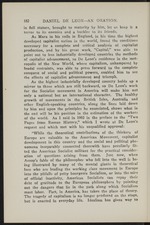 |
“...request and which met with his unqualified approval:
While the theoretical contributions of the thinkers of
Europe are valuable to the American Movement, capitalist
development in this country and the social and political phe-
nomena inseparably connected therewith have peculiarly fit-
ted the American Socialist militant for the practical consider-
ation of questions arising from them. Just now, when
Aesops fable of the philosopher who fell into the well is be-
ing illustrated by many of the mental giants in theoretical
lore who are leading the working class movement in Europe
into the pitfalls of petty bourgeois Socialism, or into the mire
of official inactivity, American Socialists can repay their
debt of gratitude to the European philosophers by pointing
out the dangers that lie in the path along which Socialism
must labor. Fact, in America, has taken the place of theory.
The tragedy of capitalism is no longer produced on the stage,
but is enacted in everyday life. Idealism has given...”
|
|
|
